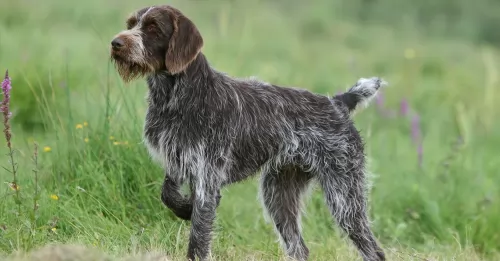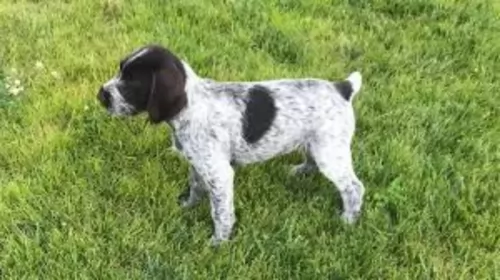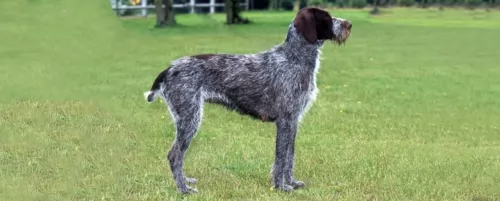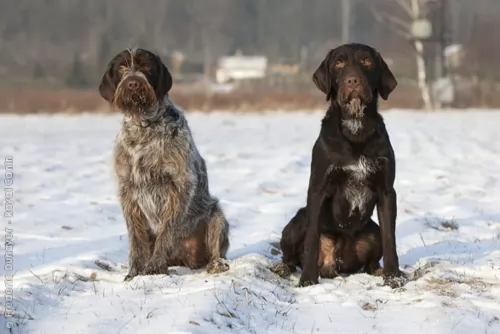 Petzlover
Petzlover Bulgarian Shepherd is originated from Bulgaria but Cesky Fousek is originated from Czech Republic. Bulgarian Shepherd may grow 9 cm / 4 inches higher than Cesky Fousek. Bulgarian Shepherd may weigh 29 kg / 64 pounds more than Cesky Fousek. Bulgarian Shepherd may live 42 years more than Cesky Fousek. Bulgarian Shepherd may have more litter size than Cesky Fousek. Bulgarian Shepherd requires Moderate Maintenance. But Cesky Fousek requires Low Maintenance
Bulgarian Shepherd is originated from Bulgaria but Cesky Fousek is originated from Czech Republic. Bulgarian Shepherd may grow 9 cm / 4 inches higher than Cesky Fousek. Bulgarian Shepherd may weigh 29 kg / 64 pounds more than Cesky Fousek. Bulgarian Shepherd may live 42 years more than Cesky Fousek. Bulgarian Shepherd may have more litter size than Cesky Fousek. Bulgarian Shepherd requires Moderate Maintenance. But Cesky Fousek requires Low Maintenance
 The Bulgarian Shepard Dog comes from the ancient line of Molossers of Central Asia and Tibet, and the shepherds of the Balkans, Turkey and Caucasus. Among the oldest and most valued of the working dogs of Europe, the Bulgarian Shepherd breed was created by mixing the Balkan breeds with the dogs from Central Asia by the proto-Bulgarians around the 7th century. The Karakachanskoto Kuche was introduced to Bulgaria and accepted by the sheep herders. Mixing this breed in with the Balkan and Central Asian mix developed the Bulgarian Shepherd we know today. In the long run the original Karakachanskoto Kuche became extinct, replaced entirely by the Bulgarian Shepherd even in places where the new breed is still called by the Kuche name. Although the breeds are not the same, most of the dog world does not know the difference.
The Bulgarian Shepard Dog comes from the ancient line of Molossers of Central Asia and Tibet, and the shepherds of the Balkans, Turkey and Caucasus. Among the oldest and most valued of the working dogs of Europe, the Bulgarian Shepherd breed was created by mixing the Balkan breeds with the dogs from Central Asia by the proto-Bulgarians around the 7th century. The Karakachanskoto Kuche was introduced to Bulgaria and accepted by the sheep herders. Mixing this breed in with the Balkan and Central Asian mix developed the Bulgarian Shepherd we know today. In the long run the original Karakachanskoto Kuche became extinct, replaced entirely by the Bulgarian Shepherd even in places where the new breed is still called by the Kuche name. Although the breeds are not the same, most of the dog world does not know the difference.
In Bulgaria however the Karakachan is a national treasure and the history of the breed runs deep. One Kuche could run up to 1200 animals and hundreds were used by the herdsmen in the mountains of Bulgaria. There were many regional types of Bulgarian Shepherds with very little difference between those types. These dogs were so prized by the shepherds that the dogs ate first before the people. The dogs however ate a vegetarian diet of milk, wheat, water and oats. The Bulgarian Shepherd lives a long life of often over 20 years. The Bulgarian Army made good use of these dogs early in the 20th century.
Following World War II, the wolves were close to extinction and property in Bulgaria was nationalized. There was no longer a need for a large force of working dogs. The Communist government exterminated large numbers of sheep dogs including the Bulgarian Shepherd. Only those species on government owned farms and in remote regions survived. When the government farms were disbanded in the early 20th century, these dogs were exterminated as well. Only those in the mountains survived. Commercial breeding of the Bulgarian Shepherd in the end of the century has resulted in controversy as other breeds came into the breeding program.
Use of breeds such as Sarplaninacs, Caucasian Ovcharkas, St. Bernards, Central Asian Ovcharkas and Bosnian Tornjaks in these programs resulted in Bulgarian Shepherd or Karakachans that were a lot different from the original breed. There is therefore some concern about the future of the breed in Bulgaria, yet they received official Bulgarian national recognition in 2000. Today’s Bulgarian Shepherd is a guard dog for both property and livestock.
The official standard for the breed came about in 1991 and in 2005 it was recognized by the Bulgarian State Commission for Animal Breeds. Only those dogs that meet this standard are considered “true” Karakachans. The Bulgarian Shepherds are willing to fight bears and wolves in defense of its family and flock. The dog is brave and loyal, dignified and powerful. They are recognized by both the Dog Registry of America, Inc. (DRA) and the Bulgarian Republican Federation of Cynology (BRFC) a member of the FCI.
 The Cesky Fousek is also known as the Bohemian Wire-Haired Pointing Griffon and he hails from the Czech Republic. The name ‘Fousek’ is referring to the dogs facial hair.
The Cesky Fousek is also known as the Bohemian Wire-Haired Pointing Griffon and he hails from the Czech Republic. The name ‘Fousek’ is referring to the dogs facial hair.
With World War 1, the dog all but disappeared, but with careful breeding, its numbers have built up. Today the dog is a popular hunting breed in its home country. In 1957 and 1958, Czechoslovakia joined the Federation Cynologique Internationale, and this is when a new breed standard was written and approved. In 1964, the dog breed was recognized by the FCI and by the United Kennel Club in 1996.
The Cesky Fousek has even been represented on postage stamps issued in the country in 1965, and again in 1973. Today, the breed is as popular as ever in the Czech Republic as well as other countries where there are breeding programs.
 A massive, powerful and muscular Molosser, the Bulgarian Shepherd is strong, agile, powerful and fast. They are intelligent and reliable. They have a long, thick, harsh coat in white with patches of black. Their skull is massive and broad with a furrowed forehead. The muzzle is massive as well while the nose has wide nostrils and is fairly large. It has close fitting, thick lips with strong, scissor bite jaws. The Bulgarian Shepherd’s eyes are deep, oblique and small. They are either hazel or dark. They have an intelligent and confident, yet firm almost grim expression.
A massive, powerful and muscular Molosser, the Bulgarian Shepherd is strong, agile, powerful and fast. They are intelligent and reliable. They have a long, thick, harsh coat in white with patches of black. Their skull is massive and broad with a furrowed forehead. The muzzle is massive as well while the nose has wide nostrils and is fairly large. It has close fitting, thick lips with strong, scissor bite jaws. The Bulgarian Shepherd’s eyes are deep, oblique and small. They are either hazel or dark. They have an intelligent and confident, yet firm almost grim expression.
Their ears are low set, small and v-shaped. They sit close to the head which sits on a powerful but short neck. They have a broad back, well-muscled body with a deep chest and long, rough tail. Their gait is a trot with a spring in their step. There are two types of coats – longhaired and shorthaired with no undercoats.
 The Cesky Fousek is a medium sized dog with both the male and the female standing between 58 – 66cm and weighing 22–28kg. The dog has a fairly distinctive appearance, looking quite a bit like a German Wire-haired Pointer, but he has the mustache and beard which the Pointer doesn’t have.
The Cesky Fousek is a medium sized dog with both the male and the female standing between 58 – 66cm and weighing 22–28kg. The dog has a fairly distinctive appearance, looking quite a bit like a German Wire-haired Pointer, but he has the mustache and beard which the Pointer doesn’t have.
The tail of this dog is carried horizontally and is generally docked to 3/5 of its natural length to give the dog a distinctive look. These days, with regulations around docking, the tail is left long. The ears are floppy and rounded at the tips and the eyes are brown.
The dog’s coat is short to medium length and fairly coarse with colors being dark roan or brown with ticked markings.
The Cesky Fousek is an energetic, eager-to-please dog and he just loves playing with the children in the home. He is an intelligent dog who is loyal, social and protective and you’ll find that he is easy to train. In fact, with socialization and training, he becomes obedient and amicable around adults, children and other pets.
 This is a working dog, intelligent and independent guard dog. Reserved around strangers but loyal and devoted with his family. Tolerant of children in their family if they were raised with them. Not only will she defend human family members, she will guard and defend household pets as well. He is quite capable of making her own independent decisions. These are very intense guard dogs that will respond aggressively if they think their people are being attacked.
This is a working dog, intelligent and independent guard dog. Reserved around strangers but loyal and devoted with his family. Tolerant of children in their family if they were raised with them. Not only will she defend human family members, she will guard and defend household pets as well. He is quite capable of making her own independent decisions. These are very intense guard dogs that will respond aggressively if they think their people are being attacked.
 The Cesky Fousek is a fun loving, good natured dog who is always up for a game. This is why he isn’t a dog that will fit into an apartment or shoe-box size garden.
The Cesky Fousek is a fun loving, good natured dog who is always up for a game. This is why he isn’t a dog that will fit into an apartment or shoe-box size garden.
Socialize and train him and he becomes a wonderful family pet, good around children and other pets. He loves human companionship and isn’t a dog to be left outside to run around on his own.
The Cesky Fousek is easy to train, and when he is treated properly and made to feel an important member of the family, he provides you with his unconditional love and friendship.
 The breed itself is known to be healthy but they do face some of the usual health issues of the massive, giant breeds. This includes knee and elbow dislocation; hip dysplasia; bloat; entropion and osteosarcoma. All of these conditions require medical intervention, but bloat and osteosarcoma are the deadliest. Bloat needs immediate attention and osteosarcoma is a deadly bone cancer.
The breed itself is known to be healthy but they do face some of the usual health issues of the massive, giant breeds. This includes knee and elbow dislocation; hip dysplasia; bloat; entropion and osteosarcoma. All of these conditions require medical intervention, but bloat and osteosarcoma are the deadliest. Bloat needs immediate attention and osteosarcoma is a deadly bone cancer.
 The average lifespan of this dog breed is about 12 to 15 years, and even though he is a robust breed, some common health issues do exist.
The average lifespan of this dog breed is about 12 to 15 years, and even though he is a robust breed, some common health issues do exist.
Certainly if you’re considering breeding for your Cesky Fousek, you’ll want to have him tested for dysplasia, eye problems and Von Willebrands Disease.
Von Willebrands Disease is an inherited bleeding disorder, caused by a deficiency in the amount of a specific protein needed to help platelets.Often the dog doesn’t show outward evidence of having the disease while other dogs might even hemorrhage from the nose or elsewhere.
 These are large dogs with large appetites, but you want to keep them lean and active. Feed them at least twice a day with a high quality large or giant dog dry food. Four to five cups of food per day is the maximum.
These are large dogs with large appetites, but you want to keep them lean and active. Feed them at least twice a day with a high quality large or giant dog dry food. Four to five cups of food per day is the maximum.
Patellar Luxation – a floating kneecap or dislocated knee. Will cause lameness.
Osteosarcoma – bone cancer must be treated immediately as it is potentially fatal.
The Bulgarian Shepherd needs a good amount of exercise every day. Remember this is a working breed and they need a job. Long walks every day are essential for his well-being.
 The coat of the Cesky Fousek is easy to maintain and you’ll want to brush him at least twice a week with a firm bristle brush to get through the coarse hair and rid him of loose hairs.
The coat of the Cesky Fousek is easy to maintain and you’ll want to brush him at least twice a week with a firm bristle brush to get through the coarse hair and rid him of loose hairs.
Ear infections are common in dogs, but dogs with floppy ears are more susceptible to ear infections than dogs with erect ears. The infection often starts in the external ear canal and occurs when excess bacteria grows in the ear canal and it becomes inflamed.
Always take your pet to the veterinarian at the first sign of an ear infection. You’ll notice your pet shaking his head and the ear may well be red and inflamed. Your vet will discuss the proper treatment and suggest ways to prevent recurrence. The vet may also recommend an ear cleaning solution as well.
This dog breed needs plenty of exercise and he’ll love his daily walks with you. Put him on a leash and allow him to run with you when you go cycling or jogging.
This is a very active dog used to hunting and he’ll require good quality protein. Speak to your vet about how many calories your dog will need each day, more so if you have a puppy and are unsure in terms of his growth.
He is a medium-to-large breed so you’ll want a food that caters for his size, his age and his energy. Include portions of rice, vegetable and meat into his kibble from time to time for variety, and never forget to include some raw meat into his diet.
Fresh, cool water is of critical importance and should be available night and day.